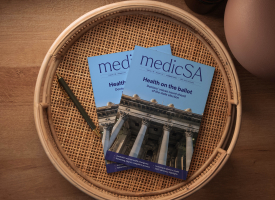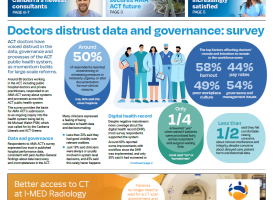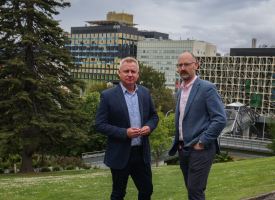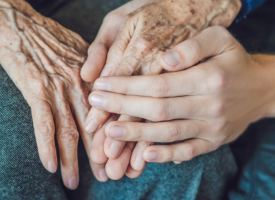AMA on mis-information, health literacy and COVID surge
Transcript: Dr Danielle McMullen on ABC News Breakfast, Friday, 11 November 2022 Subject: Misinformation, health literacy, new COVID surge, COVID booster doses and Medicare hack concerns.

HOST: STEPHANIE FARRIER: Let's get more on the warnings over a new COVID surge. The Australian Medical Association wants the Federal Government to counter health misinformation through targeted online advertising campaigns. Vice President Dr Danielle McMullen joins us now from Sydney. Thanks for joining us on News Breakfast.
DR DANIELLE MCMULLEN: Good morning.
STEPHANIE FARRIER: Well, first of all, just how widespread is this misinformation out there?
DANIELLE MCMULLEN: Well, I think we've all seen evidence over the past few years of how difficult it is to navigate health information and to work out whether what you're hearing is the full story or is it the true story. And there's some pretty clever misinformation out there, the most obvious of which has been some of the anti-vaccine messaging over the past few years. But there are more subtle takes that make it really difficult to know whether what you're hearing is the truth and the whole truth. So what we want to make sure is that Australians are empowered to understand health information and that, particularly at this time where we're still getting so much health information about COVID 19, that the government is doing everything possible to make sure that Australians are getting accurate information easily and accessibly in a language that's appropriate for them and in a format that they're accessing it, which for more and more of us is online.
STEPHANIE FARRIER: And those subtle differences that you're talking about, the subtle misinformation is really dangerous, isn't it? What have you heard back from the federal government so far?
DANIELLE MCMULLEN: Look, we know that the government does want to do what it can to improve health literacy and to make sure that health messages are getting out clearly. But government bodies can sometimes get stuck in pen and paper and we are encouraging them to do more online and to make that attractive and appealing to the community and easy to access, and to make sure that as much as possible messages are coordinated so that our state and territory governments are giving similar health advice so that they're not being pulled apart for the differences, but instead have really well-coordinated and well-resourced health information campaign.
STEPHANIE FARRIER: And obviously time is of the essence with these COVID cases increasing.
DANIELLE MCMULLEN: Exactly. We're certainly seeing an alarming increase in cases over the past couple of weeks. And so it really is important we've got that clear messaging out to people about steps they can take to reduce their chances of infection and to get treatment if they're in those high risk groups that are eligible for COVID treatment. But in the meantime, it's back to that messaging of putting masks on indoors, staying home and isolating until you're not infectious anymore, making sure those boosters are up to date because those numbers really aren't where we'd like them to be, and getting treatment, talking to your GP if you test positive to make sure that you've got access to treatment.
STEPHANIE FARRIER: And just on the masks and that recommendation that the Queensland Government is now putting out. We've heard from infectious diseases specialists that in the last time that we had those mask recommendations, only about 10 per cent of the population in Queensland took that up. What do you think the take up is going to be, not just in Queensland, but also around Australia?
DANIELLE MCMULLEN: Well, we hope it's higher than that. There has been now many months of that discussion with the population about that social contract of when the case numbers are low, we can be a bit freer and do things the way we used to do them, but on the understanding that when case numbers surge like they are at the moment, that we'll be asked to take simple steps like putting a mask on to flatten that curve, protect our most vulnerable, and in particular, make sure that our hospitals and health services can still manage the level of demand, not just from COVID, but from other illnesses and the staff shortages caused by COVID-19.
STEPHANIE FARRIER: On vaccinations, Queensland also lags a bit behind in terms of third booster doses. But would you like to see the next level of those fifth boosters be rolled out as soon as possible given this COVID surge?
DANIELLE MCMULLEN: So at the moment, the advice that ATAGI is giving is that there isn't enough evidence for a widespread fifth dose. The only people at the moment eligible for a fifth dose are people with severe immune conditions. But it is so important that we catch up on those third and fourth doses. We did a fantastic job of first and second doses, but we've really dropped the ball a bit on the third and fourth doses. So if you haven't had those, it's time to go and get it. And that at-risk group, particularly aged over 70 or with other health issues, the most important message at the moment is that there are treatments available for COVID-19. So as soon as you test positive, register that test with your state health department, but also contact your GP and arrange treatment.
STEPHANIE FARRIER: And Dr McMullen, while I've got you on the programme, just on the Medibank Private issue and obviously we've seen really intimate details that are being released by these hackers at the moment. Just what sort of concern do you have as a doctor and the AMA about the safeguarding of some of this really private information?
DANIELLE MCMULLEN: Yeah, we understand the concern across such a large number of people in the community at the moment, and it is really a difficult time for those people. Health information is the most sacred of our personal information and so it must and needs to be so safeguarded to prevent something like this ever happening again. We understand that Medibank is working with regulators to try and minimise the fallout from this, but it really is such a difficult time for the customers who've been affected.
STEPHANIE FARRIER: Do you think that it needs to be beefed up both from those companies as well as in a regulatory sense?
DANIELLE MCMULLEN: Look, we understand that there is work now, of course, taking place to establish how this happened and to prevent such a thing ever happening again. Health information is so important that it does need the highest levels of security around it and people need to feel safe that their health information is protected. So every measure does need to be taken to review this and understand how it happened and how to prevent it happening again.
STEPHANIE FARRIER: Certainly it is a very worrying time for all of those Medibank past and present customers out there. Thank you very much for your time, Dr Danielle McMullen from the AMA.



